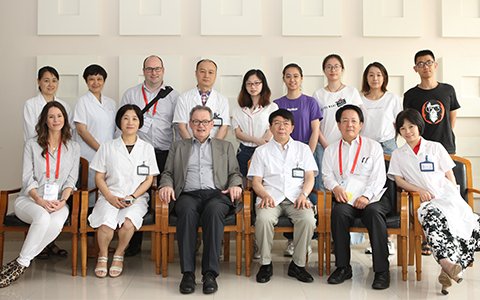NDARC researchers make links with Chinese Academy of Sciences (CAS)
Professor Michael Farrell, Director of the National Drug and Alcohol Research Centre (NDARC), and Dr Ryan Courtney and Dr Emily Stockings, NDARC researchers, recently attended a workshop at the Chinese Academy of Sciences (CAS) Institute of Neuroscience (ION) in Shanghai, China, aimed at matching UNSW researchers with counterparts at CAS ION.
The visit forms part of the UNSW 2025 Strategy and was initiated by UNSW Vice Chancellor Ian Jacobs and Professor Jie Zhang, formerly President of Shanghai Jiao Tong University, who held high level talks in late 2017 to develop a research partnership between UNSW and the CAS ION in Shanghai, China. The ensuing UNSW-CAS Neuroscience Workshop was held at the ION on 23 and 24 July 2018, in Shanghai, China.
The two-day program was co-chaired by Professor Ana Deletic, UNSW Pro Vice-Chancellor, Research, and Prof Mu-Ming Poo, Director, ION, and involved a series of in-depth presentations, showcasing the impressive body of work conducted by researchers at UNSW and CAS. The program was divided into three key themes: Biomedical Engineering and Basic Neuroscience, Ageing and Cognitive Impairment, and Mental Illness and Addiction.
- Professor Farrell chaired the session on Mental Illness and Addiction and gave an overview of projects underway at NDARC, with a focus on treatment innovations for opioid dependence in Australia.
- Dr Courtney summarised key clinical trials exploring novel and innovative treatments for improved smoking cessation.
- Dr Stockings gave an overview of the epidemiological work being conducted at NDARC in the space of mental health and substance use predictors, prevention and treatment.
On the second day of the workshop, UNSW researchers were invited to tour the impressive clinical and research facilities at the Shanghai Mental Health Center (SMHC), hosted by Vice-President and Professor of Psychiatry, Min Zhao. SMHC is a WHO Collaborating Centre and operates both as a mental health clinic and a major teaching and research institute, with 1300 staff.
NDARC researchers gave presentations on their work and engaged in productive discussions regarding future research collaborations, including smoking cessation treatment and implementation, studies on ketamine and depression, and work on amphetamines.
Read more on the NDARC website.











